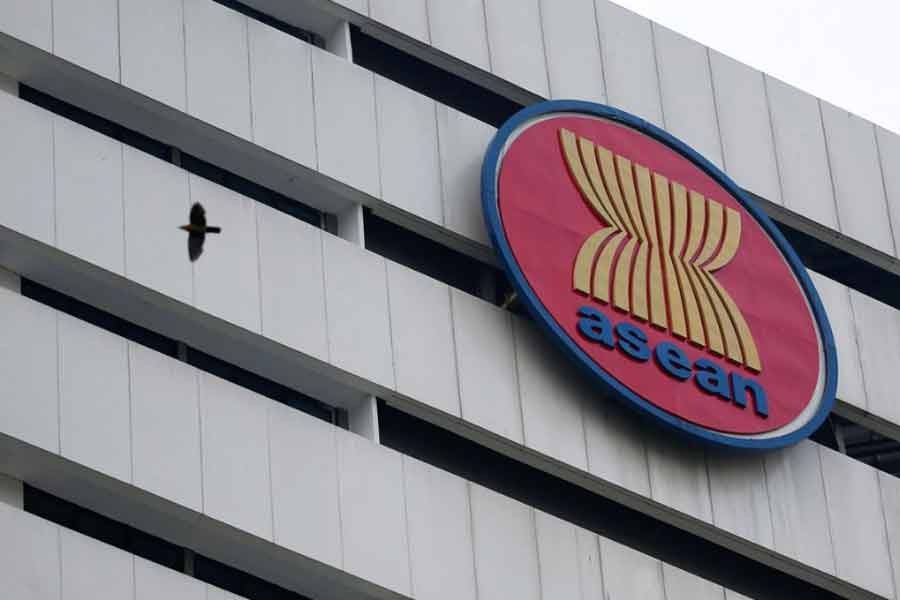The chair and secretary-general of the Association of Southeast Asian Nations (ASEAN) plan to travel to Myanmar this week even as the 10-nation bloc remains divided on how to respond to the military coup there, four diplomatic sources said.
ASEAN, a grouping that includes Myanmar and has a policy of non-interference in the affairs of members, has led the main diplomatic effort to resolve the violent turmoil gripping the country following the overthrow of a democratically-elected government four months ago.
The military has detained Myanmar's civilian leader, Aung San Suu Kyi, and imprisoned political opponents amid a deadly crackdown on protesters, resulting in a growing refugee crisis and the collapse of the economy.
Erywan Yusof, the second minister for foreign affairs for Brunei, ASEAN's chair this year, and the bloc's secretary-general Lim Jock Hoi, also from Brunei, are scheduled to meet this week with leaders of the junta, among other stakeholders, the sources, who asked not to be identified, said.
The sources warned that a trip could be delayed or derailed by last-minute logistical and diplomatic impediments.
It is unclear if the pair plan to meet with opponents of the junta, many of whom are imprisoned or in hiding. Spokesmen for ASEAN and the Myanmar opposition's National Unity Government did not respond to requests for comment. Brunei's ASEAN mission also did not respond to a request for comment.
The planned trip comes more than five weeks after ASEAN leaders announced a "five-point consensus" to end violence; promote dialogue; deliver aid; appoint a special envoy; and send a delegation headed by the envoy to Myanmar to meet "with all parties concerned".
However, the special envoy has yet to be appointed amid divisions within ASEAN over the best person or persons for the job, the envoy's mandate and the length of the envoy's term.
A "concept paper" released by Brunei to ASEAN members last month proposed the envoy only hold the position for the rest of the year, when it would be reviewed by the next chair of ASEAN, due to be Cambodia, said three sources familiar with its contents. They said the paper also proposed limiting the envoy's job to mediating, not basing them in Myanmar, giving them a small staff paid for by the home country of the envoy.
The conditions were seen by several ASEAN states as fatally undermining the stature and leverage of the envoy, they said.
Brunei - an oil-rich sultanate of fewer than 500,000 people with little diplomatic leadership experience - has not responded to the concerns, the sources added. The envoy represents the chair, so is technically appointed by Brunei, said one diplomat.
ASEAN operates on consensus decision-making, but it is a diverse grouping of democracies, an absolute monarchy, along with authoritarian and one-party communist states, and it seldom takes a strong stand on issues involving one of its own.
"ASEAN is haemorrhaging. There is a lot of intra-ASEAN diplomatic sniping. There is unhappiness all around," said one source familiar with negotiations.
"JUNTA BUY-IN"
All four diplomatic sources said Indonesia and Thailand, two of ASEAN's most important members, were at loggerheads over the envoy.
Indonesia initially favoured a single envoy to lead a task force while Thailand, whose military has close ties to neighbouring Myanmar, pushed for a "friends of the chair" body of multiple representatives, the sources said.
Spokespeople for the foreign ministries of Indonesia and Thailand declined to comment on their stance.
The compromise supported by most ASEAN states is for three envoys, likely made up of representatives from Indonesia, Thailand and Brunei, two sources said.
ASEAN foreign ministers will meet in China next week for the annual China-ASEAN summit. If their disagreement on the envoy isn't sorted out beforehand, the sources said it was hoped to be finalised on the sidelines of the summit.
China watered down a UN Security Council resolution on Myanmar but said the current political situation was "absolutely not what China wants to see".
Since the ASEAN five-point consensus was announced, Myanmar's junta has said it will only consider the proposals - including a visit from an envoy - once it has restored stability.
The military regime's position undermined ASEAN's claim of a unified position, but also reflected diplomatic realities given Myanmar's membership of the bloc, diplomats and analysts said.
"All of this only works if there is full buy-in from the junta," said one regional diplomat.
ASEAN's divisions also underpinned its rejection of a draft UN resolution to impose an arms embargo on Myanmar last week, said three sources. Several ASEAN nations were comfortable with weapons freeze being included in the non-binding resolution, they said, but resistance led by Thailand and Singapore ensured ASEAN requested the clause be removed.
Singapore's foreign ministry did not respond to requests for comment.
There is also conflict among ASEAN states about when to deliver aid to Myanmar, amid fears from some that the early deployment of assistance without any commitment from Myanmar to hold dialogue with its opponents could be exploited by the junta for propaganda purposes, two of the sources said.


